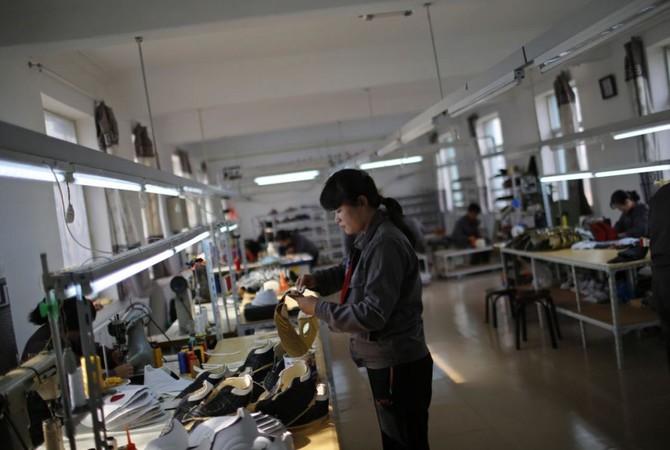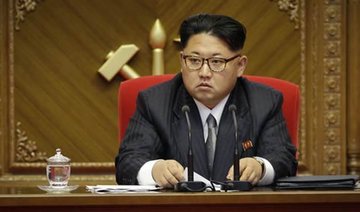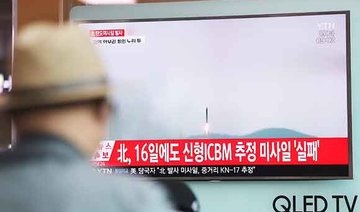DANDONG, China: Chinese textile firms are increasingly using North Korean factories to take advantage of cheaper labor across the border, traders and businesses in the border city of Dandong said.
The clothes made in North Korea are labeled “Made in China” and exported across the world, they said.
Using North Korea to produce cheap clothes for sale around the globe shows that for every door that is closed by ever-tightening UN sanctions another one may open. The UN sanctions, introduced to punish North Korea for its missile and nuclear programs, do not include any bans on textile exports.
“We take orders from all over the world,” said one Korean-Chinese businessman in Dandong, the Chinese border city where the majority of North Korea trade passes through, who spoke on condition of anonymity because of the sensitivity of the issue.
Dozens of clothing agents operate in Dandong, acting as go-betweens for Chinese clothing suppliers and buyers from the US, Europe, Japan, South Korea, Canada and Russia, the businessman said.
“We will ask the Chinese suppliers who work with us if they plan on being open with their client — sometimes the final buyer won’t realize their clothes are being made in North Korea. It’s extremely sensitive,” he said.
Textiles were North Korea’s second-biggest export after coal and other minerals in 2016, totaling $752 million (SR2.8 billion), according to data from the Korea Trade-Investment Promotion Agency (KOTRA). Total exports from North Korea in 2016 rose 4.6 percent to $2.82 billion.
The latest UN sanctions, agreed earlier this month, have completely banned coal exports now.
Its flourishing textiles industry shows how impoverished North Korea has adapted, with a limited embrace of market reforms, to sanctions since 2006 when it first tested a nuclear device. The industry also shows the extent to which North Korea relies on China as an economic lifeline, even as US President Donald Trump piles pressure on Beijing to do more to rein in its neighbor’s weapons programs.
Chinese exports to North Korea rose almost 30 percent to $1.67 billion in the first half of the year, largely driven by textile materials and other traditional labor-intensive goods not included on the UN embargo list, Chinese customs spokesman Huang Songping said.
Chinese suppliers send fabrics and other raw materials required for manufacturing clothing to North Korean factories across the border where garments are assembled and exported.
Australian sportswear brand Rip Curl publicly apologized last year when it was discovered that some of its ski gear, labeled “Made in China”, had been made in one of North Korea’s garment factories. Rip Curl blamed a rogue supplier for outsourcing to “an unauthorized subcontractor”.
But traders and agents in Dandong say it’s a widespread practice.
Manufacturers can save up to 75 percent by making their clothes in North Korea, said a Chinese trader who has lived in Pyongyang.
North Korea has about 15 large garment exporting enterprises, each operating several factories spread around the country, and dozens of medium sized companies, according to GPI Consultancy of the Netherlands, which helps foreign companies do business in North Korea.
North Korean factories humming with ‘Made in China’ clothes
North Korean factories humming with ‘Made in China’ clothes

Egypt-born Dina Powell McCormick appointed Meta president and vice chairman

- The former Goldman Sachs partner and White House official previously served on Meta’s board of directors
- Powell McCormick, who was born in Cairo and moved to the US as a child, joins the management team and will help guide overall strategy and execution
LONDON: Meta has appointed Egypt-born Dina Powell McCormick as its new president and vice chairman.
The company said on Monday that the former Goldman Sachs partner and White House official, who previously served on Meta’s board of directors, is stepping up into a senior leadership role as the company accelerates its push into artificial intelligence and global infrastructure.
Powell McCormick, who was born in Cairo and moved to the US as a young girl, will join the management team and help guide its overall strategy and execution. She will work closely with Meta’s Compute and infrastructure teams, the company said, overseeing multi-billion-dollar investments in data centers, energy systems and global connectivity, while building new strategic capital partnerships.
“Dina’s experience at the highest levels of global finance, combined with her deep relationships around the world, makes her uniquely suited to help Meta manage this next phase of growth as the company’s president and vice chairman,” Meta founder and CEO Mark Zuckerberg said.
Powell McCormick has more than 25 years of experience in finance, national security and economic development. She spent 16 years as a partner at Goldman Sachs in senior leadership roles, and served two US presidents, including stints as deputy national security adviser to Donald Trump, and a senior State Department official under George W. Bush.
Most recently, she was vice chair and president of global client services at merchant bank BDT & MSD Partners.














